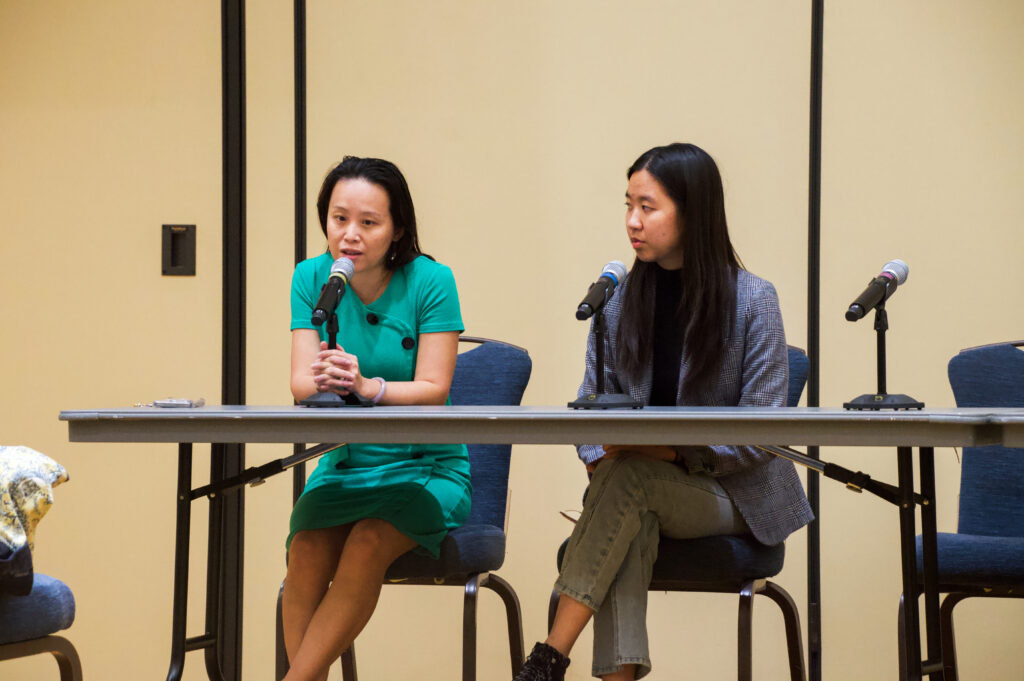Panel discusses AAPI culture, history and experiences in the DMV area
3 min read
Yuen and Leu discuss their history, culture and experiences as Asian-Americans. | Abbey Magnet, The Weekly Ringer
by MATEO GUTIERREZ
Staff Writer
On Oct. 30, UMW hosted a panel discussion that brought faculty, students and local community members together to delve into the rich tapestry of Asian American and Pacific Islander (AAPI) history, culture and experiences. This event, which was hosted in the Chandler Ballroom, sought to foster a deeper understanding of and build allyship with the AAPI community.
The event, titled “Exploring AAPI History, Culture, and Experiences: Building Allyship at UMW,” was a collaborative effort between UMW’s Office of Diversity and Inclusion, the Asian Student Association and the local AAPI community. Panelists included Guan-Yi Leu, assistant professor of political science and international affairs; Steve Rabson, adjunct instructor in the modern languages and literature department; Evelyn Yuen, a volunteer for the Viet Place Collective; and Jingying Li, an IT professional and Spotsylvania County resident of 30 years.
Rabson began the discussion by providing a comprehensive overview of AAPI history and culture within the greater Washington, D.C. area. He highlighted the immense diversity within the community and focused specifically on the establishment of Chinatown in the district.
“This was a real community, it had Chinese schools, churches, language teaching at the churches and other culture centers,” he said.
Rabson also spoke on the range of ethnic backgrounds and how different groups have migrated and left their own indelible marks on the communities in which they live.
Yuen, a second-generation Chinese-American, shared her experience with Eden Center. Eden Center is a primarily Vietnamese-American commercial center that was founded in 1984 and is home to over 120 family-owned businesses, according to their website. It is located in Falls Church, Va. and is the largest of its kind on the East Coast.
“I actually grew up in Hong Kong, but every summer I would come to the DMV where the rest of my clan lives and to visit them, and every summer we would go to Eden Center,” she said. “So even though I emigrated here five years ago, Eden Center gives me a piece of home and it’s also a place where I find belonging.”
Yuen is also a volunteer with Viet Place Collective—an organization based in Falls Church that aims to uplift and uphold Vietnamese culture in the greater Washington, D.C. area. Recently, the organization has been working to preserve Eden Center and combat gentrification in the surrounding neighborhood. Maintaining community during periods of mass development has been a proven challenge for Asian-Americans in the area. Both Yuen and Rabson commented on the Metrorail that displaced what was formerly Little Saigon.
“As Dr. Brooks mentioned, in Clarendon, they built this new metro station which displaced the former little Saigon to where is now Eden Center,” Yuen said.
In regards to economic impact, Leu discussed the importance of international trade partnerships between the West and East Asian countries. She asserted that strengthening trade relationships will benefit all parties and promote allyship.
“I think that there’s a hope and I personally believe that, more collaboration, more economic opportunity, definitely can change a lot of things,” she said.
Li spoke firsthand of her experience moving to the United States from China. Her family fled China following the release of her father from prison for a charge regarding what was deemed as anti-government behavior. She moved to the U.S. when she was 15 years old and detailed her tumultuous teenage years where she initially struggled to fit in. Prior to her family’s move when she was in tenth grade, she had difficulty connecting with her peers.
“There was almost no niche space for me to thrive,” she said.
It was only after she started public school and enrolled in English as a Second Language (ESL) classes that she became more comfortable in her own skin.
“I thrived at school, within the first year I could speak fluently. My grades were great and I made some friends,” she said.
This panel discussion provided an opportunity for attendees to gain a deeper understanding of the issues faced by the AAPI community and how they can contribute to building a more inclusive environment.
“Asian Americans are an important part of American history. And, in general, people should be sensitive to the issues that minorities face in this country,” said Rabson.


